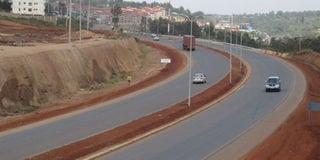Is heavy investment in roads, power a solution to poverty?

Road construction has been a priority in the last four budget years. FILE PHOTO
What you need to know:
The question. Roads and energy take up the biggest share of the budget. However, have the allocations contributed to the poverty fight?
For some time now infrastructure, particularly roads construction and energy, have taken the lion’s share in the Budget.
In his State of the Nation address last week, President Museveni emphasised investment in roads and energy as deliberate and strategic plan to transform the economy.
The budget for roads has over the years risen from Shs398b to Shs3.4 trillion while energy has seen its allocations increase from Shs178b to Shs2.8 trillion per annum.
However, the question now is: will the heavy investment in the two sectors address the acute poverty?
Analysts have varied views and according to Julius Mukunda, the Civil Society Budget Advocacy Group executive director, budget allocation is no longer an issue of agenda setting.
“Financing infrastructure is assumption-based. We need investments in education and agriculture to unlock the economy,” he says.
His argument is supported by the National Planning Authority audit, which points out the failure of government agencies to have coordinated implementation of budget priorities.
“Immediate investment in agriculture and tourism will bring the money into the economy and boost purchasing power,” he says, noting the lack of priority on two of the most important sectors of the economy.
The heavy investment in infrastructure, as it seems now, has not controlled the increase in poverty levels, which are moving northwards.
Poverty levels have increased from 19.7 per cent in 2012/13 to 21.4 per cent in 2016/2017, according to the Uganda National Household Survey 2016/17 conducted by Uganda National Bureau of Statistics.
The figures put the number of poor Ugandans at about eight million, which according to details, such people cannot afford three meals a day.
Therefore, it would be important that we start thinking of a shift or refocus budget priorities.
“The budget can only do so much. Everybody is hungry and they cannot feed off a loaf of bread,” says Dr Fred Muhumuza, a lecture at Makerere University. Nearly all the sector of the economy, he says, are underfunded and those, such as infrastructure, which take up the biggest chunk of the budget are struggling to pay debts.
The investment in energy, Dr Muhumuza says, has not brought down electricity tariffs, which negatively impacts the economy.
The budget plans for a short period of time (12 months) instead of the long term, which makes it difficult to accommodate long term objectives of about or more than 20 years.
The consequence of such “straight jacket” budget, however, prompts government into borrowing and therefore incurring debts.
Therefore, according to Daniel Birungi, the Uganda Manufacturers Association executive director, balance between infrastructure investment and using the budget to trigger economic growth must be a priority.
“As manufactures, [we think] investment in infrastructures is key. Affordable and consistent power is good. However, there is need to stimulate the economy by [providing] affordable credit to manufactures to be competitive,” he says.
Beyond this, according to Mr Lawrence Bategeka, the vice chairperson of the committee on national economy in Parliament, the budget should be able to boost the purchasing power of the population as well as ensure that suppliers are paid on time.
For the budget to makes sense, he says, supplier must not take upto to six months to be paid.
He also cautions against the lack of proper control on lending to the government, which tends to crowd out the private sector from long term investment financing.
However, he supports the heavy investment in infrastructure development so long as it is not hampered by delays.
A budget for foreign contractors
Contracts: “The energy and roads construction sector is mostly dominated by foreign contractors, which takes away jobs from Ugandans.
As a result, analysts terms the budget as a Chinese affair because many of the contracts end in that direction.
However, Mr Henry Musasizi, the Parliamentary committee on finance chairman, thinks differently because many Ugandan contractors are still struggling with capacity issues.”
He also believes that we must sacrifice some things for the sake of the future as it will “make sense to invest now in infrastructure [which will later] boost trade and the economy”.




